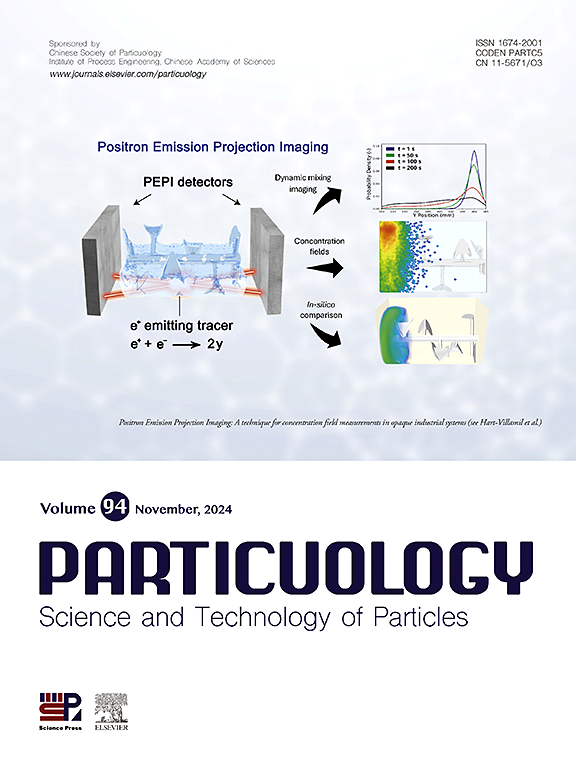磁场强化D-psicose反溶剂-冷却耦合结晶的研究
IF 4.1
2区 材料科学
Q2 ENGINEERING, CHEMICAL
引用次数: 0
摘要
D-psicose是一种罕见的糖,目前因其独特的功能和医疗潜力而吸引了更多的关注。它主要是通过DTE或DPE将果糖转化,然后经过纯化和结晶步骤得到的。在本研究中,开发了一种创新的反向抗溶剂冷却耦合结晶工艺,以生产产率高且晶体尺寸合理的D-psicose。具体来说,抗溶剂乙醇的使用降低了整个体系的粘度,这在一定程度上改善了传质过程,而冷却过程保证了高收率,因为D-psicose的溶解度随着温度的升高而下降。在研究过程中,通过响应面法对耦合工艺进行优化,获得了84%的收率。通过对过饱和的精确调节,使结晶尺寸增大到266 μm,适合下游过滤、干燥等。为了进一步提高工业生产率,在整个过程中使用磁场强化结晶过程,使总结晶时间从普通的70-195 h缩短到50 h。可以认为,新型反向抗溶剂-冷却耦合结晶有利于高效、高质量地生产D-psicose。本文章由计算机程序翻译,如有差异,请以英文原文为准。

Study on the coupled reverse antisolvent-cooling crystallization of D-psicose intensified by magnetic field
D-psicose is a rare sugar that has currently attracted more attention for its unique functionality and medical potential. It is mainly obtained by converting fructose through DTE or DPE, followed by purification and crystallization steps. In this study, an innovative coupled reverse antisolvent-cooling crystallization process was developed to produce D-psicose with high yield and reasonable crystal size. Specifically, the usage of antisolvent ethanol decreased the viscosity of the whole system, which somehow improved the mass transfer process, while the cooling process ensured the high yield since the solubility of D-psicose was found to drop with temperature. During the study, the coupled process was optimized through response surface methodology, and the yield of 84% was obtained. With the precise regulation to supersaturation, the crystal size was enlarged to 266 μm, which was suitable for downstream filtration, drying etc. To further intensify the industrial productivity, a magnetic field was used throughout to intensify the crystallization process, with which the total crystallization duration was shortened to 50 h from common 70–195 h. It is believable that the new coupled reverse antisolvent-cooling crystallization was advantageous to efficiently produce D-psicose with high quality.
求助全文
通过发布文献求助,成功后即可免费获取论文全文。
去求助
来源期刊

Particuology
工程技术-材料科学:综合
CiteScore
6.70
自引率
2.90%
发文量
1730
审稿时长
32 days
期刊介绍:
The word ‘particuology’ was coined to parallel the discipline for the science and technology of particles.
Particuology is an interdisciplinary journal that publishes frontier research articles and critical reviews on the discovery, formulation and engineering of particulate materials, processes and systems. It especially welcomes contributions utilising advanced theoretical, modelling and measurement methods to enable the discovery and creation of new particulate materials, and the manufacturing of functional particulate-based products, such as sensors.
Papers are handled by Thematic Editors who oversee contributions from specific subject fields. These fields are classified into: Particle Synthesis and Modification; Particle Characterization and Measurement; Granular Systems and Bulk Solids Technology; Fluidization and Particle-Fluid Systems; Aerosols; and Applications of Particle Technology.
Key topics concerning the creation and processing of particulates include:
-Modelling and simulation of particle formation, collective behaviour of particles and systems for particle production over a broad spectrum of length scales
-Mining of experimental data for particle synthesis and surface properties to facilitate the creation of new materials and processes
-Particle design and preparation including controlled response and sensing functionalities in formation, delivery systems and biological systems, etc.
-Experimental and computational methods for visualization and analysis of particulate system.
These topics are broadly relevant to the production of materials, pharmaceuticals and food, and to the conversion of energy resources to fuels and protection of the environment.
 求助内容:
求助内容: 应助结果提醒方式:
应助结果提醒方式:


